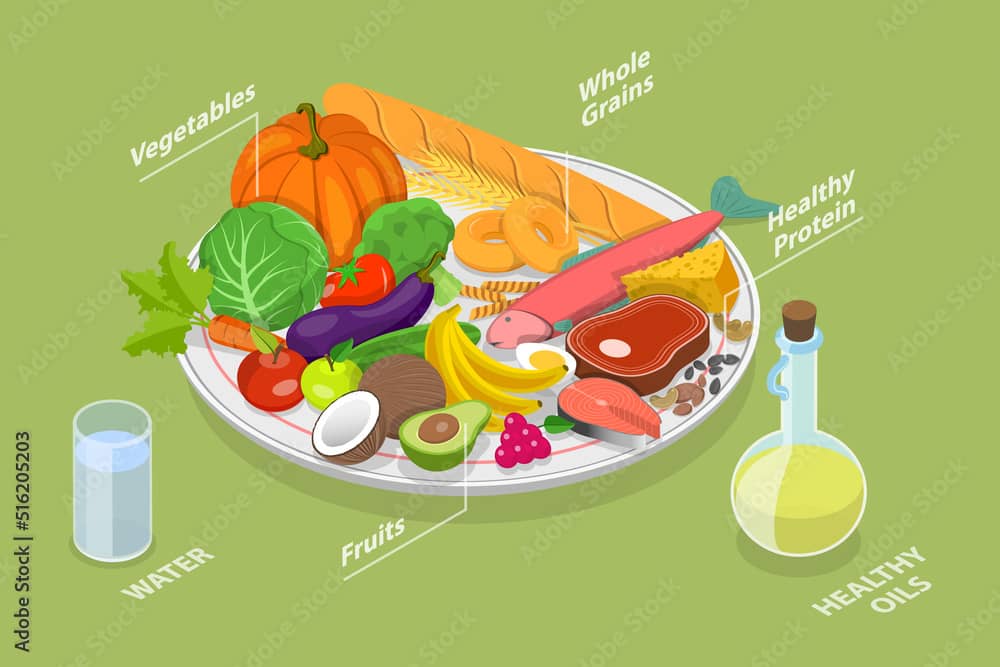
Dear readers,
Have you ever wondered, “What are the key elements of a healthy diet?” Absolutely. Imagine having a blueprint for healthy eating within your reach. Today, ŵe will uncover the components of a balanced diet, which will lead hopefully to a better understanding of healthy eating./p>
The key elements of a healthy diet typically include a balance of fruits, vegetables, whole grains, lean proteins, and healthy fats. It’s essential to limit added sugars, salt, and processed foods while staying adequately hydrated. Remember, individual dietary needs may vary, so consulting a healthcare professional or nutritionist is very important.
For example, there are certain medical conditions that require a special diet. People with diabetes should follow a diet low in carbohydrates, sugar, and fat to control their blood sugar levels. Also, people with high blood pressure should follow a diet low in sodium to control pressure.
That is why a healthy diet is essential for maintaining overall well-being and promoting a strong and energetic body. The key elements of a healthy diet encompass a wide range of nutrients and food groups that work together to provide the body with the necessary fuel and nourishment it requires functioning optimally.
First and foremost, fruits and vegetables play a crucial role in a healthy diet. These colorful and nutrient-rich foods are packed with vitamins, minerals, and antioxidants that support immune function, aid in digestion, and contribute to a healthy heart by blood pressure support. They also provide dietary fiber, which helps regulate bowel movements and keeps you feeling full and satisfied.
Whole grains are another important component of a healthy diet. These grains, such as brown rice, quinoa, and whole wheat, retain their natural fiber, vitamins, and minerals, unlike refined grains, which have undergone processing that strips them of essential nutrients. Whole grains provide sustained energy, promote digestive health, and can reduce the risk of chronic diseases like type 2 diabetes and heart disease.
Protein is a building block for our bodies, and incorporating lean sources of protein is vital in a healthy diet. Options like fish, poultry, beans, lentils, tofu, and nuts offer essential amino acids that aid in tissue repair and support muscle development. Protein also helps you feel full, making it easier to manage weight and maintain steady energy levels.
Healthy fats are often misunderstood, but they are essential for various bodily functions. Sources like avocados, nuts, seeds, and olive oil provide monounsaturated and polyunsaturated fats that support heart health, brain function, and nutrient absorption. They also play a role in hormone production and cell membrane integrity.
Dairy or dairy alternatives can be included in a healthy diet, providing calcium, vitamin D, and protein. Opting for low-fat or non-fat versions helps reduce saturated fat intake while still obtaining essential nutrients.
Limiting added sugars and salt is crucial in maintaining a healthy diet. Excess sugar consumption has been linked to obesity, type 2 diabetes, and tooth decay. Similarly, too much salt can contribute to high blood pressure, which increases the risk of heart disease. It’s essential to read food labels and choose products with lower sugar and sodium content.
Processed foods, with their high levels of unhealthy fats, added sugars, and sodium, should be limited or avoided altogether. These foods lack the nutritional value of whole, unprocessed foods and can lead to weight gain and various health issues when consumed regularly.
Hydration is often overlooked but is a critical component of a healthy diet. Water is essential for maintaining body temperature, transporting nutrients, and eliminating waste products. Drinking an adequate amount of water each day ensures proper bodily functions and overall well-being.
Finally, portion control is essential in maintaining a balanced diet. Eating in moderation helps prevent overeating, maintains a healthy weight, and ensures that you are providing your body with the right amount of nutrients without excessive calories.
In conclusion, we discussed that a healthy diet consists of a well-rounded selection of fruits, vegetables, whole grains, lean proteins, and healthy fats. Also, It involves limiting added sugars, salt, and processed foods while staying hydrated and practicing portion control.
By adopting these key elements into your daily eating habits, you can support your body’s health and vitality, promoting a better quality of life. A blueprint of health has been provided here in a nutshell.
Remember, it’s crucial to consult with healthcare professionals or nutritionists to tailor a diet that meets your individual needs and goals.
Thank you for reading this article.
If you have any comments, please leave them below in the specified area.
Have a healthy day.
Blessings always,
Maxine


Great post, Maxine.
Should I go to a nutritionist for additional assistance to monitor pre-diabetic symptoms?
For two months, my fasting blood glucose levels have elevated by twenty points.
Best regards,
Jewelise
Hi Jewelise,
Thank you for stopping by and leaving a valid comment. You can go to a nutritionist to chart why the sudden changes in your levels. Maybe you have introduced a specific food in your diet like mango, sugar apple or mesple. Although these are fruits, they are very high in sugar. Another good idea is to have you A1C verified at the clinical lab. This report will help the nutritionist to provide better service. I do hope everything goes well for you.
All the best, ️
️ ️
️
Maxine